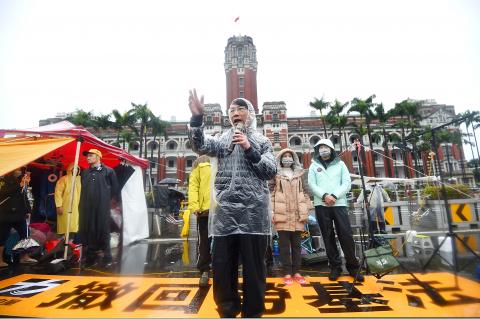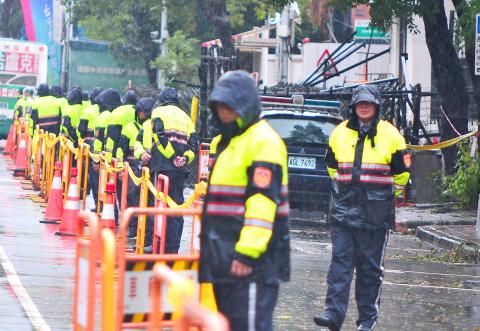New Power Party (NPP) members yesterday filed a legal complaint against Taipei City police for the use of force in dismantling NPP lawmakers’ temporary rain shelter in front of the Presidential Office Building, while they continued their hunger strike against proposed amendments to the Labor Standards Act (勞動基準法).
NPP Executive Chairman Huang Kuo-chang (黃國昌) and Legislator Hsu Yung-ming (徐永明) signed an authorization form to commission a team of lawyers who went to the Taipei District Prosecutors’ Office and filed the legal complaint.
Huang and Hsu said the police early yesterday morning applied force when taking down their temporary rain shelter, which led to a scuffle.

Photo: Chien Jung-fong, Taipei Times
Doing so had breached provisions of the Criminal Code (刑法) they said, adding that by erecting wired barricades to restrict traffic and pedestrians, police had violated the Assembly and Parade Act (集會遊行法).
Attorney Chiu Hsien-chih (邱顯智), who is heading the NPP’s legal team, said Taipei police had abused their power by extending the area of the street barricades and should be charged with damaging personal property when they forcefully dismantled the rain shelter.
NPP legislators also criticized the authorities for sending an excessive number of officers and redundant security measures, saying only about 30 people protested through the night, but there were several hundred police on guard in the area.

Photo: Wang Yi-sung, Taipei Times
Such security measures were necessary because NPP members had continually used social networks to broadcast the protest live and to call on supporters to join the protest, Taipei Police Department Zhongzheng District First Precinct Chief Liao Tsai-chen (廖材楨) said.
“The five NPP legislators have been engaging in an illegal assembly in front of the Presidential Office Building, which is a restricted area, due to national security considerations,” Liao said.
“We acted legally in accordance with the Assembly and Parade Act, first serving notice with a warning placard ordering the protesters to terminate their action and to disperse,” he added.
Liao said that NPP members setting up the rain shelter on the street and other protest activities had blocked traffic and were in violation of the Road Traffic Management and Penalty Act (道路交通管理處罰條例).
“Therefore we requested that they remove it on their own, but since they did not obey the notice, police officers had to move in to dismantle it,” he said.
Taipei City Councilor Hsu Shu-hua (許淑華), of the Democratic Progressive Party, said that 380 police officers had been deployed in connection to the NPP’s hunger strike over the past few days.
“This has overextended the Taipei police, diverting them from their regular duties of maintaining social order and public safety, regulating road traffic and other security tasks,” she said.
“The police had to keep watch over the protest in rainy and cold conditions. This has placed much strain on government resources, and the police officers are tired,” Hsu said. “Therefore, I really cannot agree with this protest action [by NPP legislators].”
Some police officers also voiced complaints in response to Huang’s statements that the authorities had treated the protesters harshly.
“We ask the public to not just look at the legislators, but the police who have to keep watch during the protest,” one policeman told reporters yesterday.
“We are here all day and all night with the cold weather and drenched by the rain,’ he said. “They had sleeping bags and some shelter, but we do not have any of these things when fulfilling our duty.
As of press time last night the hunger strike was still continuing.

A preclearance service to facilitate entry for people traveling to select airports in Japan would be available from Thursday next week to Feb. 25 at Taiwan Taoyuan International Airport, Taoyuan International Airport Corp (TIAC) said on Tuesday. The service was first made available to Taiwanese travelers throughout the winter vacation of 2024 and during the Lunar New Year holiday. In addition to flights to the Japanese cities of Hakodate, Asahikawa, Akita, Sendai, Niigata, Okayama, Takamatsu, Kumamoto and Kagoshima, the service would be available to travelers to Kobe and Oita. The service can be accessed by passengers of 15 flight routes operated by

Chinese spouse and influencer Guan Guan’s (關關) residency permit has been revoked for repeatedly posting pro-China videos that threaten national security, the National Immigration Agency confirmed today. Guan Guan has said many controversial statements in her videos posted to Douyin (抖音), including “the red flag will soon be painted all over Taiwan” and “Taiwan is an inseparable part of China,” and expressing hope for expedited reunification. The agency last year received multiple reports alleging that Guan Guan had advocated for armed reunification. After verifying the reports, the agency last month issued a notice requiring her to appear and explain her actions. Guan

GIVE AND TAKE: Blood demand continues to rise each year, while fewer young donors are available due to the nation’s falling birthrate, a doctor said Blood donors can redeem points earned from donations to obtain limited edition Formosan black bear travel mugs, the Kaohsiung Blood Center said yesterday, as it announced a goal of stocking 20,000 units of blood prior to the Lunar New Year. The last month of the lunar year is National Blood Donation Month, when local centers seek to stockpile blood for use during the Lunar New Year holiday. The blood demand in southern Taiwan — including Tainan and Kaohsiung, as well as Chiayi, Pingtung, Penghu and Taitung counties — is about 2,000 units per day, the center said. The donation campaign aims to boost

The Central Weather Administration (CWA) said a magnitude 4.9 earthquake that struck off the coast of eastern Taiwan yesterday was an independent event and part of a stress-adjustment process. The earthquake occurred at 4:47pm, with its epicenter at sea about 45.4km south of Yilan County Hall at a depth of 5.9km, the CWA said. The quake's intensity, which gauges the actual effects of a temblor, was highest in several townships in Yilan and neighboring Hualien County, where it measured 4 on Taiwan's seven-tier intensity scale, the CWA said. Lin Po-yu (林柏佑), a division chief at the CWA's Seismological Center, told a news conference